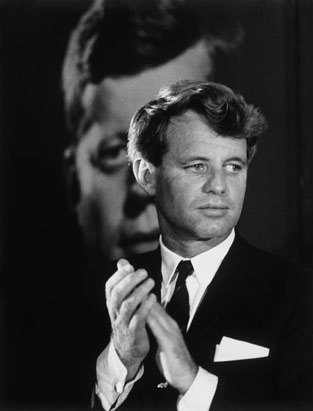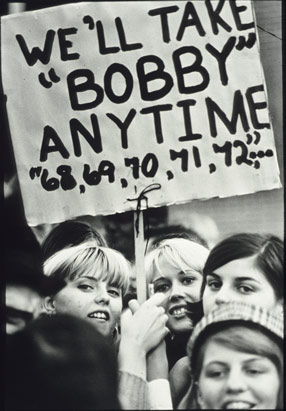
Robert Kennedy was born on November 20, 1925. In his families twenty plus room mansion, Bobby and his siblings did not have an ordinary childhood. His father Joseph P. Kennedy was Chairman of the U.S. Securities and Exchange Comission during FDR’s presidency, director of Maritime Commission, and was the United States Ambassador to United Kingdom. With his father’s prominent political career, politics was in his running throughout his blood. Fast forward to age eighteen; Bobby Kennedy enlisted into the U.S. Navy Reserve. After three years of serving and an honorable discharge, Kennedy enlisted as a junior at the very prestigious Harvard University. With a Bachelor of Arts in government, he soon embarked on the road to his political career and a six month tour of Europe. He then entered the University Of Virginia School Of Law, once graduating successfully completed the Massachusetts bar exam. Internal Security Section of the Criminal Division of the United States Department of Justice was the next step, investigating Soviet agents got tiring so he was then transferred to prosecute fraud cases in New York. Next twenty seven years old, Kennedy was enlisted in his older brother, John Fitzgerald’s campaign for presidency. Nine years later on January 20th 1961, both John F. Kennedy and Bobby Kennedy entered an entirely new stratosphere, one became President and the other became the 64th Attorney General of the United States.
But suddenly and sadly JFK’s plans were cut short on November 22nd, 1963 when he was assassinated in Dallas, Texas.


His beliefs and actions towards a better life, nation wide and world wide were civil rights for all. In a speech given in front of South African students, Kennedy stated, "[People] who strike out against injustice show the highest form of courage. Each time a man stands up for an ideal, or acts to improve the lot of others, he sends forth a tiny ripple of hope, and crossing each other from a million different centers of energy and daring, those ripples build up a current that can sweep down the mightiest walls of oppression and resistance," (Robert.)
Kennedy campaigned for rights of all, whether it was voting rights, the ability to go to school, or use public facilities. Both Kennedy brothers proposed the Civil Rights Act of 1964, in which “outlawed racial segregation in schools, public places, and employment,” (Civil.) With this came the largest scale win for minority groups.

When he was New York Senator, Bobby Kennedy began programs for students with disabilities and disadvantages, starting his world wide effort to create an awareness of underprivileged and poverty stricken citizens. His past did not reflect his need to help those of less fortune. Wealth and family name was unimportant when it came to living in a more equal and fair world, when it comes down to it, it was the “right thing to do” (Policy.) In 1966, he toured South Africa in efforts to help anti-Apartheid movement bring to an end to repressing the nation. Robert Kennedy wanted social improvement, even if it meant putting himself in harms way. No one during his time would risk politics in other countries, especially South Africa. Robert Kennedy was not afraid to speak out against authority. He was against the Vietnam War, like many during the late sixties. His outspoken nature was the reason why he created so much buzz around his campaign.




